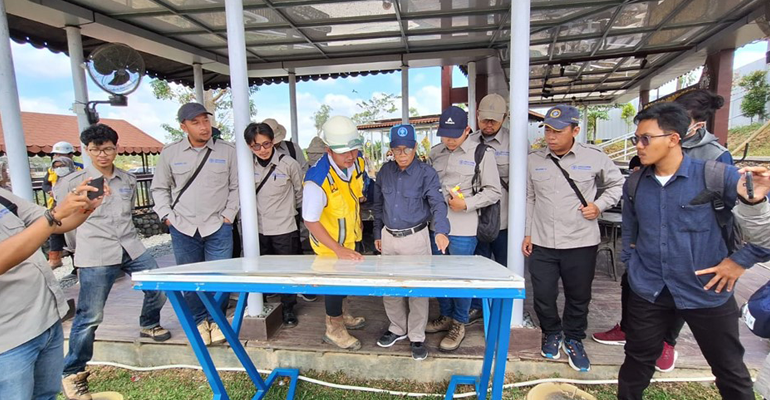Researchers from IPB University Visit IKN, Completed Environmental Study Standard Development

Following the activity of developing environmental study standards in the National Capital Region (IKN), researchers from IPB University from the Department of Aquatic Resourcea Management (MSP), the Faculty of Fisheries and Marine Sciences (FPIK), and the Center for Environmental Science (PPLH), conducted a direct visit to the IKN. A total of 18 researchers from IPB University conducted an overview and engaged in discussions with several project managers involved in the development of the IKN.
This visit was also conducted in collaboration with staff from the Center for Standardization of Environmental Quality Instruments (PSIKLH) of the Ministry of Environment and Forestry (KLHK) of the Republic of Indonesia and Gadjah Mada University. In total, approximately 50 researchers visited various locations in the IKN.
“This activity is carried out to enrich the development of several draft environmental study standards in the IKN, where currently, ongoing, and future construction of numerous facilities and infrastructure to complete the office building developments are currently taking place,” said Prof Hefni Effendi, the head of the IPB University research team.
These standards, he explained, are intended to provide guidance for the preparation of environmental impact assessments (Amdal) and Environmental Management Efforts-Environmental Monitoring Efforts (UKL-UPL) for various sectors. The agreed upon standards will subsequently be uploaded to the amdal.net website.
Before visiting the IKN, these researchers also visited the Environmental and Forestry Instrument Standardization Application Center (BPSILHK) in Samboja to discuss the objectives of this visit. During their time in the IKN, the team was accompanied by personnel designated by the IKN Authority to explain the various ongoing developments and escort them to project sites for overviews and Q&A sessions with project managers.
Some of the locations visited included the zero point of the archipelago, an observation tower, and several development project sites in the IKN, such as ministerial housing complexes, the Bendungan Sepaku Semoi, the Sepaku River intake, water distribution pipelines, ports, bay crossing bridges, and highways.
“It is hoped that this visit to IKN locations can enrich and refine the draft environmental study standards being developed, which will also receive input from relevant sectors,” emphasized Prof Hefni, who is also the Head of the MSP Department at IPB University.
The Urgency of Environmental Management Documents to ensure that environmental aspects are prioritized in all development activities in the country, every sector’s development, whether in the form of businesses or activities, must be accompanied by environmental management documents. This is in accordance with the provisions of Government Regulation (PP) No. 22 of 2021 concerning the Implementation of Environmental Protection and Management.
According to Prof Hefni Effendi, environmental issues arising from development cannot be resolved solely through standard operational procedures (SOP) for environmental management. This is due to the diversity of development types, environmental typologies, and the heterogeneity of community groups as recipients of benefits and impacts from development.
“Therefore, environmental studies are needed that the type of which is determined by the level of risk arising from business or activities on the environment and also considering the scale or magnitude of business or activities. This is why PSIKLH has been entrusted with developing environmental study standards,” he explained.
These environmental study standards will serve as guidelines in the environmental management assessment process for all business or activities conducted by various sectors. (IAAS/DSR)



